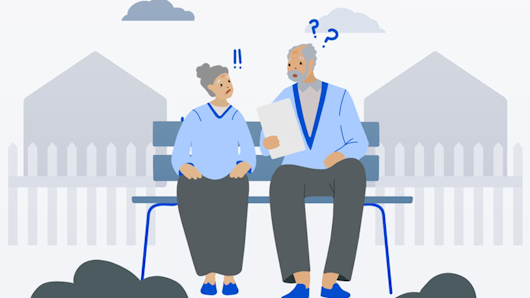Making a will can be simple and inexpensive. We explain what to consider and the legal requirements when making a will.
Wills aren’t just for those who have a lot of assets. Every adult should have a will. That's because the law is inflexible about what happens to your possessions if you die without one. A will can also help you leave a legacy for your loved ones to remember you by.

Dying without a will
Where there’s no will – called ‘dying intestate’ – your estate will be divided up in accordance with the Administration Act.
Your spouse or partner gets your personal possessions (such as cars,
furniture, jewellery, appliances etc), the first $155,000 of the
estate and one-third of the rest. The other two-thirds goes to your
child/children in equal shares.If you have no children, your partner gets your personal possessions,
the first $155,000 and two-thirds of the rest. Your parents get the
other third. Your partner gets the lot if your parents are deceased.If you have children but no partner, the entire estate is left to the
children in equal shares.If you have no partner or children, your parents inherit. If your
parents are deceased, the entire estate is left to blood relatives or
to the Crown if no relatives exist.
Making a will
Only 50% of adults have a will. Some of us may fear the bills that result but making a will can be relatively inexpensive. The expensive bit can be the will's administration after your death: these costs come out of your estate and vary depending on who administers the will.
Do-it-yourself
You’re legally entitled to make a will yourself. A DIY job may be fine if your assets are modest and your family relationships orderly. But if not, you may need to seek legal advice.
There are potential downsides to DIY. Experts say home-made wills may create problems if the will-maker’s intentions aren't clear. Simple errors – for example, the will is not signed or witnessed properly – can also create grounds for challenge.
The professionals
Most people use a lawyer or trustee company like Public Trust to draw up their will. This doesn’t mean the will can’t be challenged, but using a professional should help to ensure the will is legally valid.
Some law firms may also prepare a will for free if you're doing other business with them. However, they may expect to be named as the executor.
Your executor
You can choose anyone to be your executor. The person doesn't have to be a lawyer: they can be a family member or friend. It's common for people to name a friend or relative and a professional as co-executors (they’ll administer the estate together).
There can be advantages in naming a legal expert as an executor because they can deal with legal matters. Probate (authorisation to administer your estate) will usually need to be obtained from the High Court. Your legal expert can also deal with the transfer of any property.
Friend or family
If you name a friend or family member as executor, they may be willing to do the job for free. But there are still likely to be some costs that have to be met, such as High Court fees for applying for probate. You can specify that these costs are to be met by your estate.
Trustee company
If you choose a trustee company as the executor, it will charge for time plus disbursements such as court filing fees, photocopying and postage. By law, trustee companies are limited to charging a maximum fee of 5% of the gross value of your estate.
Lawyer
Like trustee companies, lawyers' fees for estate administration can be based on an hourly rate, a task-based rate, a percentage of the gross value of the estate or some combination of these methods.
Before you sign up, you're entitled to ask what the lawyer's fees are likely to be and the scope of the work that will be undertaken. Lawyers must provide you with information in advance about the basis for their charges.
Legal issues
Writing a will won't give you freedom to do whatever you want. Otago University law professor Nicola Peart says if you overstep your legal rights, the will can be challenged. And challenges are fairly common, she says.
Adequate provision
The Family Protection Act says you have a moral duty to provide for close family members in your will. If you don’t, they have a right to contest the will because you haven't made adequate provision for them. Cutting a close family member from your will is extremely difficult to do, if they choose to challenge it.
Blended families
It can be difficult to provide for a blended or step-family in your will, so it’s important that you take care when drafting it. The laws that govern wills apply to your step-family too. It means if you leave a step-child out of your will, they can challenge it. Disputes over wills can get complicated and costly, especially when a blended family is involved. If you’ve got a blended family, we recommend engaging a professional, like a trustee company or lawyer, to help draft your will.
Promises
The Law Reform (Testamentary) Promises Act says if you’ve promised someone a reward for their services in your will, and don’t keep that promise, they can contest the will. Say you hire a caregiver and tell her you can’t afford to pay her much, but you’ll see her right in your will. If you don’t keep that promise, she may challenge the will.
Significant others
If you've been in a relationship for 3 years or more, the Property (Relationships) Act says your partner is entitled to half your relationship property if you separate or die. This applies to married, civil union and de facto couples. You can “contract out” by making an agreement with your partner. If you die, your partner has 6 months to either accept what you leave them in your will or claim their share under the Act.
Wills checklist
A will should state the following:
that it’s your last will and revokes all previous wills
how you want your estate distributed
who will be your executor/s
who will be the legal guardians of children under 18 if you and your partner are dead
anything else that’s important to you (such as instructions for your funeral).
Your will must be written and dated. You must sign it in the presence of two witnesses who also sign it. They should state they are doing so in your presence and in the presence of each other. Neither the witnesses nor their partners should be beneficiaries of the will.
Use plain English: if a lawyer tries to foist a will on you that you can’t understand, insist on a rewrite.
Never physically attach anything to your will. The attachment may leave marks and the court may be concerned that these marks indicate there were other instructions forming part of the will (called a codicil). Review your will regularly and update it whenever your circumstances change.
Living wills
A living will, also called an “advance directive”, states what medical care you should be given if you become physically or mentally unable to decide for yourself.
You might want to make a living will saying you should or shouldn’t be resuscitated or that you want life support turned off in certain circumstances. Medical professionals can't ignore an advance directive unless there are reasonable grounds to doubt its validity.
The Health and Disability Commissioner says validity revolves around whether you:
were competent to make the particular decision
made the decision free from undue influence
were sufficiently informed to make the decision
intended the directive to apply to the specific circumstances.
Bank accounts
What happens to someone’s bank accounts after they die?
The banking ombudsman has published a guide explaining what happens to a deceased customer’s bank accounts. There is certain information people must provide, and processes banks must follow.
First, the bank will need to be told of the customer’s death by relatives, friends or a lawyer. The bank might request a copy of the death certificate. The bank then normally freezes the deceased customer’s accounts. Joint accounts will usually be transferred into the remaining account holder’s name.
The bank can then only take instructions from someone authorised to act on behalf of the deceased’s estate. This usually involves obtaining probate or letters of administration from the High Court so the executors or administrators can deal with the deceased’s property.
Once the bank knows it is dealing with an authorised person it can transfer the money to an “estate account” that the executors or administrators set up. This estate account is then used to distribute funds, such as money gifted in the will.
Unless you’re the authorised person, you can’t find out the balance of a dead person’s accounts. Even after death, banks still have a duty of confidence to their customer. They can’t give information about the customer’s accounts to anyone who isn’t legally entitled to it – even next of kin or estate beneficiaries.
The banking ombudsman’s guide gives definitions for some commonly used words you might hear following a death. It also gives examples of cases the ombudsman has handled where family have sought information about a deceased’s bank accounts but been denied this by the bank.
Glossary
Administrator
A person or organisation appointed by the court to pay the bills and distribute the assets of someone who dies intestate.
Codicil
A document that makes changes to an existing will.
Estate
Your assets minus your liabilities.
Executor
The person (named in the will) who will carry out the will-maker’s instructions and distribute the estate’s assets.
Intestate
The term used when a person dies without a will.
Probate
A document issued by the High Court after your death authorising the executor to administer your estate. Probate is usually required if the estate is over $15,000.
Trustee
A person or organisation responsible for holding any of the will-maker’s property until it can be paid to the beneficiaries.
Trustee companies
Organisations that specialise in handling wills, estates and trusts.

Stop unfair retirement village contracts
Retirement villages promise the good life in your golden years, however, the contracts are often heavily favour the village. We are calling for a fairer deal for retirement village residents.



